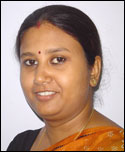 “The number of women civil engineers is encouragingly on the rise in India,” says Dr. Aparna (Dey) Ghosh, Associate Professor – Department of Civil Engineering, Bengal Engineering and Science University, Shibpur, Howrah.
“The number of women civil engineers is encouragingly on the rise in India,” says Dr. Aparna (Dey) Ghosh, Associate Professor – Department of Civil Engineering, Bengal Engineering and Science University, Shibpur, Howrah.
Dr. Ghosh entered Jadavpur University to pursue a Bachelor’s degree in Civil Engineering in 1989 and topped with Gold Medal. “I was then very keen to join the industry rather than make a career in academics,” she says. Although she obtained a very good percentile in GATE, Dr. Ghosh joined Development Consultants Pvt. Ltd, a civil consulting firm in Kolkata. She worked under senior engineers in the area of thermal power plants for a year and left to pursue her Master’s in Structural Engineering for the next two years at IIT-Kanpur.
Later, Dr. Ghosh joined M.N. Dastur and Co. where she gained experience in steel design and fabrication for four years. “However, I wanted to pursue research as well and finally left Dastur and Co. and took up a full-time research position at my alma mater, Jadavpur University, as a Senior Research Fellow,” she explains.
Dr. Ghosh worked on liquid dampers for aseismic design of structures and in 2003 she joined the erstwhile Bengal Engineering College, Shibpur, as a Lecturer and is currently Associate Professor. She obtained her Ph.D. in 2004. “My areas of interest include vibration control of structures, structural dynamics and seismic design of structures,” she notes.
On the role of women civil engineers in India, Dr. Ghosh says, “Earlier, there was this notion that when you see two distant objects in an expanse of green under a shimmering noonday sun, one is a cow and the other, in all probability, is a civil engineer! Now people have come to realise that there is a stunning versatility in this particular engineering discipline, which has been truly called the mother of all engineering.”
Women civil engineers in industry have good job options in design firms and in project management. Long-term site jobs are less appealing chiefly because they are physically more taxing and the living conditions may not be very suitable. However, the occasional site visit should present no problems and should be availed of to expand the engineer’s practical understanding of the subject. The popular Structural Engineering discipline presents research choices in earthquake and wind engineering, composite materials, uncertainty and reliability analysis, high performance steel and concrete etc.
Environmental engineering, water resources engineering, geotechnical engineering and transportation engineering are the other major civil engineering specialisations for women engineers, Dr. Ghosh concludes.











